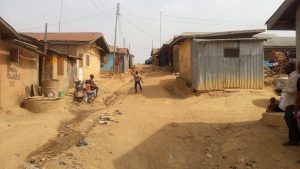It is likely that there are plans in the pipeline, (hoping that this will not lead anyone to bursting the pipelines to confirm if there are, indeed, any plans there) to make Abuja, Nigeria’s capital city cleaner and more livable. While the world waits for such plans to materialise, the Abuja that exists appear to have an unfair share of hubs of poverty conforming to Nigeria’s unenviable new status as the poverty headquarter of the world. A sampler:
This is Mararaba as one approaches Abuja from Keffi: it is poverty stricken, congested and chaotic as can be seen from the two images:

It is an ensemble of activities, from a young hawker standing dangerously by a car caught in the traffic jam to an attempt to cross from and into the other side and so many other things going on in one hub of poverty
 From Mararaba to Mpape, the slum that has been at the centre of a tug of war between the current occupants – mainly the urban poor who allocated it to themselves in the context of forced and unforced migration from other parts of Nigeria into Abuja. Mpape presents a dilemma: It is too unhealthy for human habitation but the problem is made more complicated if the place is demolished in the name of making Abuja clean. Mpape and the cleansing of slums ought to be a serious item on the agenda of politics if this were not democracy with police vigilance!
From Mararaba to Mpape, the slum that has been at the centre of a tug of war between the current occupants – mainly the urban poor who allocated it to themselves in the context of forced and unforced migration from other parts of Nigeria into Abuja. Mpape presents a dilemma: It is too unhealthy for human habitation but the problem is made more complicated if the place is demolished in the name of making Abuja clean. Mpape and the cleansing of slums ought to be a serious item on the agenda of politics if this were not democracy with police vigilance!
It remains a puzzle that environmentalists, NGOs committed to anti-poverty agendum, IGOs dealing with habitat and housing, the political parties, the philanthropists and similar actors are silent on Mpape and the slums in and around Abuja.

Ogabo Street, Mpape! That is it!

Still in Mpape where this picture would seem to speak for itself
It would seem that, like Nigeria itself, managing Abuja is also a challenge for the Nigerian ruling class. Yet, Abuja is its other solid achievement additional to overcoming the Biafran secession attempt.




























